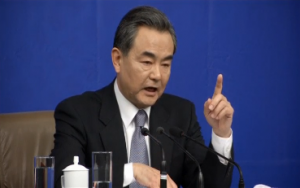
(Reuters) — Chinese Foreign Minister Wang Yi on Sunday (March 8) defended China’s activities in the South China Sea, hinted at inviting Japan to a commemorative World War II military parade and said progress has been made on the Sino-Indian border dispute.
At a news conference on the sidelines of China’s annual National People’s Congress, Wang defended his government’s controversial policy of reclamation on disputed isles in the South China Sea which has sparked regional concern, and said Beijing was not seeking to overturn the international order.
China claims about 90 percent of the South China Sea, the resources-rich waters that was also claimed by Vietnam, Phillippines, Malaysia, Brunei and Taiwan.
It took a step forward by undertaking reclamation work on six other reefs it occupies in the Spratlys in the South China Sea, expanding land mass five-fold, aerial surveillance photos show. Images seen by Reuters last year appeared to show an airstrip and sea ports.
“China is undertaking necessary construction work on its own islands. This is not aimed at, nor will it affect, anyone. We are not like some countries which have carried out ‘illegal building’ in other people’s home, and we won’t accept unwarranted remarks about work on our own home. As long as they are legal and reasonable then we have the right to do it,” said Wang.
China’s hardline stance has stoked fears in Washington, Tokyo and some Southeast Asian capitals that Beijing is increasingly trying to play by its own rules and ignore international norms, as Chinese President Xi Jinping seeks a global position commensurate with China’s new economic power.
In the news conference Wang also said that China will welcome all national leaders to a military parade, likely in September, to mark the 70th anniversary of the end of World War Two, the strongest sign yet that it could invite wartime enemy Japan.
“For China, to adopt the methods of other countries (in commemorating the WWII victory), including holding organised activities such as a commemorative military parade, is completely normal and natural. Our goal is to remember history, commemorate the martyrs, cherish peace and look to the future. We will extend an invitation to the leaders of all relevant countries and international organisations. No matter who it is, as long as they come in sincerity, we welcome them,” he said.
Sino-Japan relations have long been poisoned by what China sees as Japan’s failure to atone for its occupation of parts of the country before and during the war, and it rarely misses an opportunity to remind its people and the world of this.
In the last two years, ties have also deteriorated sharply because of a dispute over a chain of uninhabited islets in the East China Sea, though Chinese and Japanese leaders met last year in Beijing to try to reset relations.
Wang added that progress has also been made on drawn-out border talks with India.
“At the moment, the boundary negotiation is in the process of building up small and positive developments. It’s like climbing a mountain: the going is tough, and that is only because we are on the way up. Therefore China will continue to develop good relationship with India, to provide momentum in (further developing) border talks between both countries,” said Wang.
The neighbouring giants have had numerous rounds of talks over the years without making much apparent process, in a dispute which dates back to a brief border war in 1962.
China claims the northeast Indian state of Arunachal Pradesh, calling it south Tibet.
A largely successful trip of Xi in India last year was overshadowed by a stand-off between Chinese and Indian troops in Ladakh, another disputed area.
Still, the nuclear-armed neighbours have been trying to move past the issue and concentrate on their broader relationship, which has deep historical roots. Indian Prime Minister Narendra Modi is expected to visit China this year.







